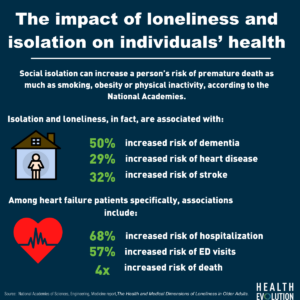The issues of loneliness and isolation are near to the heart of Lisbeth Briones-Roberts. As the U.S.-born daughter of Mexican immigrants, in fact, she went through an identify crisis as a child.
“I didn’t fit completely in American culture or completely in Mexican culture. I often felt lonely,” Briones-Roberts says. “Over time, I became more comfortable with myself, but loneliness came back to my attention when I started working in the aging sector. Of course, then the pandemic hit and I saw how pervasive loneliness is and I wanted to do something about it.”
That something is SCAN Health Plan’s new Togetherness Program, which Briones-Roberts leads as SCAN’s Chief Togetherness Officer. It’s not just her, of course. Briones-Roberts is quick to credit the SCAN team for establishing the peer-to-peer program designed to reduce loneliness by connecting seniors during the pandemic and into the future by building on the success of its Member-to-Member Program.
What available data reveals about social isolation and loneliness
Preliminary surveys conducted as early as April 2020 suggested a 20-30 percent increase in isolation and loneliness weeks into the shelter-in-place and quarantine restrictions. In late February of 2020, the National Academies of Sciences, Engineering, Medicine published a report, The Health and Medical Dimensions of Loneliness in Older Adults, that determined “the health care systems remains an underused partner in preventing, identifying and intervening for social isolation and loneliness among adults over age 50.”
 That research found that approximately 25 percent of Americans 65 and older are socially isolated and people over 50 are more likely to experience risk factors associated with isolation and loneliness, notably chronic illness and sensory impairments. The National Academies report also suggested that social isolation can increase an individual’s risk of premature death as much as smoking, obesity or physical inactivity, isolation is associated with a 50 percent increased risk of dementia, 29 percent increased risk of heart disease, 32 percent increased risk of stroke — and among heart failure patients loneliness is associated with a 4x increased risk of death, 68 percent increased risk of hospitalization and 57 percent increased risk of ED visits.
That research found that approximately 25 percent of Americans 65 and older are socially isolated and people over 50 are more likely to experience risk factors associated with isolation and loneliness, notably chronic illness and sensory impairments. The National Academies report also suggested that social isolation can increase an individual’s risk of premature death as much as smoking, obesity or physical inactivity, isolation is associated with a 50 percent increased risk of dementia, 29 percent increased risk of heart disease, 32 percent increased risk of stroke — and among heart failure patients loneliness is associated with a 4x increased risk of death, 68 percent increased risk of hospitalization and 57 percent increased risk of ED visits.
“People who are socially isolated, lonely and frail — that’s a dangerous problem,” Briones-Roberts says. “It’s important to address loneliness head on.”
What’s more, an article in the Journal of American Medical Association, found in that in April 2020 13.6 percent of US adults experiences symptoms of serious psychological distress compared to 3.9 percent in 2018 and in the same month 13.8 percent of U.S. adults indicated that they always or often felt lonely.










